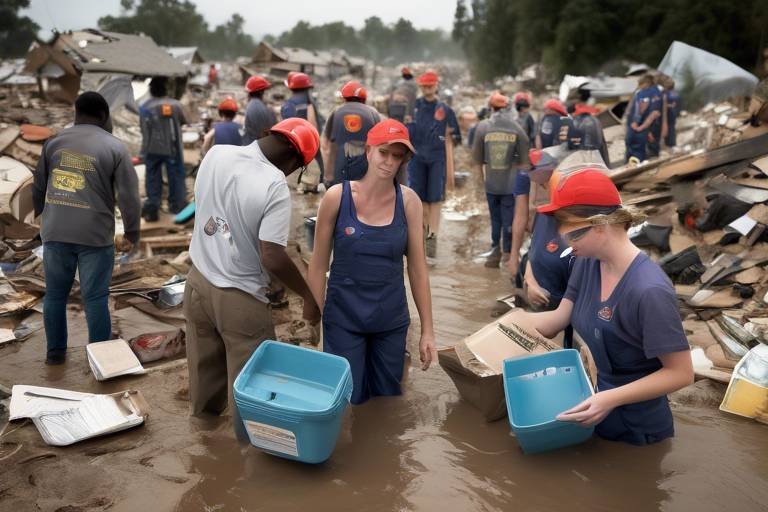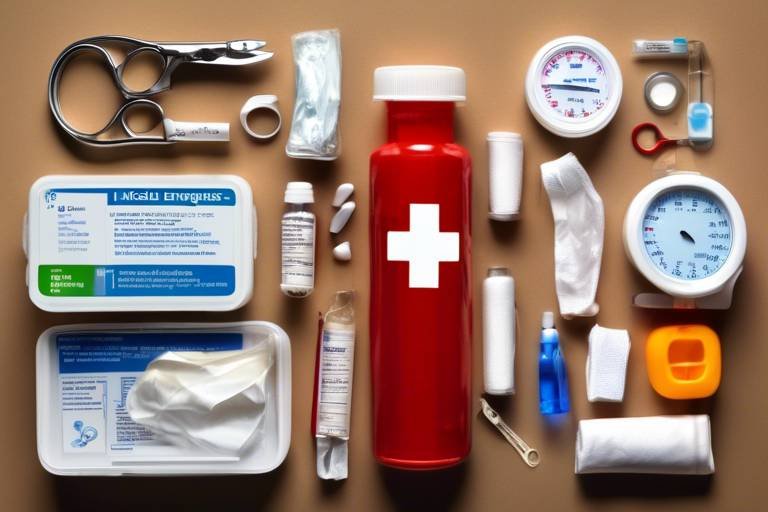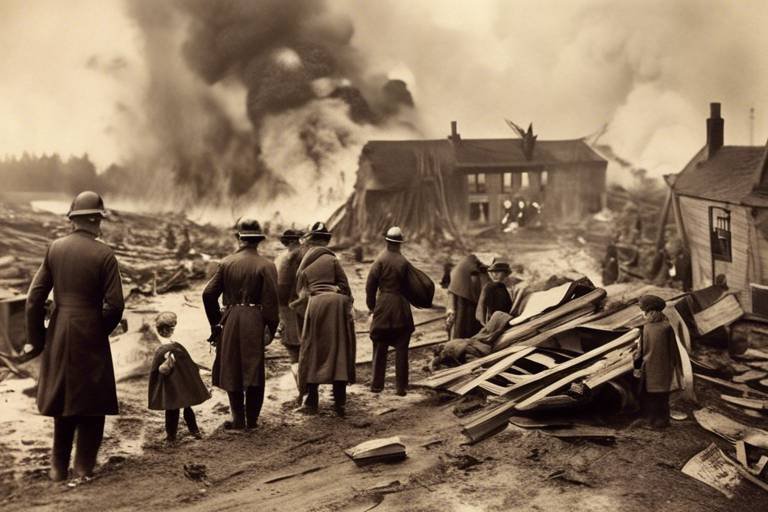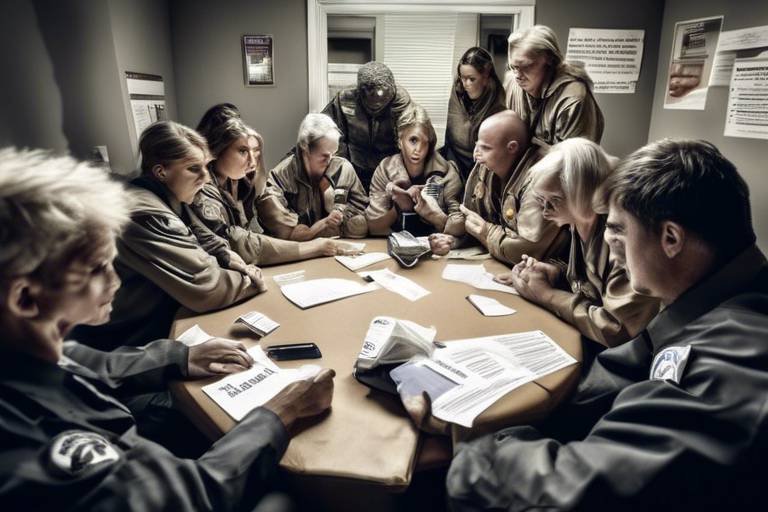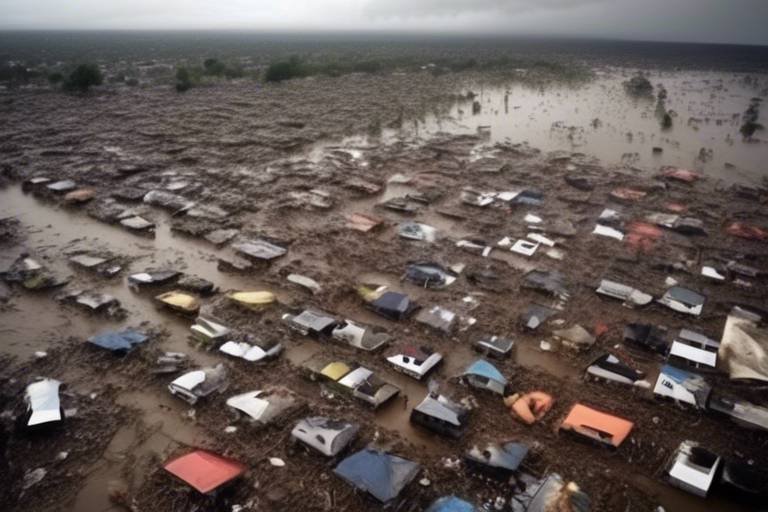Critical Documents to Save in Case of Emergencies
When life throws unexpected challenges your way, having the right documents at hand can make all the difference. Emergencies can arise in various forms—natural disasters, medical crises, or even unexpected financial hardships. Imagine the chaos of trying to prove your identity or access crucial financial resources when you’re in a panic. That’s why it’s essential to have a well-organized collection of critical documents saved and easily accessible. Not only do these documents serve as your lifeline in dire situations, but they also provide peace of mind knowing that you are prepared for the unexpected. So, what exactly should you keep in your emergency stash? Let’s dive into the essentials!
First and foremost, having your identification documents readily available is crucial during emergencies. These documents help verify your identity and can be required for various services, including medical care and legal assistance. Think about it: if you find yourself in a situation where you need immediate medical attention, the last thing you want to worry about is whether you can prove who you are. Essential identification documents include:
- Driver's License or State ID
- Passport
- Social Security Card
- Birth Certificate
Having these documents organized and stored in a secure but accessible place can save you a lot of headaches later on. It’s like having a superhero cape ready to go when you need to spring into action!
Next up are your financial records. These documents are vital for managing your finances in emergencies. They provide proof of income and assets, which can be essential for securing loans or assistance. Imagine losing everything in a disaster—how would you prove what you had? Key financial records to keep include:
- Bank Statements
- Tax Returns
- Pay Stubs
- Investment Statements
By keeping these records organized, you’ll be better equipped to navigate financial challenges that may arise during emergencies. It’s like having a financial roadmap to guide you through turbulent times.
Keeping copies of your insurance policies is another critical step. These documents ensure you have immediate access to coverage details, which is crucial for filing claims and understanding your rights during emergencies. Whether it’s home insurance, auto insurance, or health insurance, knowing what you’re covered for can make a world of difference. Here’s what to include:
- Health Insurance Policy
- Homeowners or Renters Insurance
- Auto Insurance
- Life Insurance
Having this information on hand can streamline the claims process significantly, allowing you to focus on recovery instead of paperwork.
Your health insurance information is essential for receiving medical care. This includes policy numbers and contact details for providers, which can expedite treatment during urgent situations. Imagine being in a hospital and needing to provide your insurance details quickly—it’s crucial to have this information at your fingertips.
Similarly, property insurance details, including coverage limits and claims procedures, can help you recover quickly after disasters. Having this information readily available can ease the stress of navigating the claims process, allowing you to focus on rebuilding your life.
Legal documents, such as wills and powers of attorney, are critical for managing your affairs during emergencies. They ensure your wishes are respected and that someone can act on your behalf if needed. Think of these documents as your safety net, providing protection for your loved ones and your assets.
Maintaining copies of your medical records is vital for receiving appropriate care during emergencies. They provide healthcare providers with essential information about your medical history and current medications. In a crisis, having this information can mean the difference between life and death.
Vaccination records are particularly important during public health emergencies. They confirm your immunization status and may be required for travel or entry into certain facilities. Keeping these records updated and accessible can help you navigate health-related challenges more effectively.
Having a list of emergency contacts readily available is essential. This list should include family members, friends, and medical professionals who can be reached for support during crises. It’s like having a lifeline you can reach out to when the going gets tough.
Finally, creating digital copies of important documents ensures you can access them from anywhere. Cloud storage and secure backups can safeguard your information against loss or damage during emergencies. Think of it as having a virtual safety deposit box that you can access at any time, no matter where you are. This practice not only provides convenience but also adds an extra layer of security to your important documents.
Q: What types of documents should I prioritize for emergencies?
A: Start with identification documents, financial records, insurance policies, legal documents, medical records, and emergency contacts.
Q: How should I store these documents?
A: Keep physical copies in a secure location and create digital backups in cloud storage for easy access.
Q: Are there any documents I can eliminate?
A: It’s best to keep all essential documents; however, you can prioritize based on your personal circumstances and needs.

Identification Documents
Having readily available is crucial during emergencies. Imagine being in a situation where you need immediate medical assistance, but you can't prove who you are. It’s a nightmare scenario, right? Identification documents serve as your lifeline, helping to verify your identity and providing access to essential services. These documents can be a bridge between chaos and order, ensuring that you can navigate through various situations without getting lost in the shuffle.
So, what exactly should you keep in your emergency kit? Here’s a quick rundown of the most vital identification documents:
- Government-issued ID: This could be your driver's license or passport. These are often required for medical care, legal services, and even for securing temporary housing.
- Social Security card: This little card holds a lot of power. It’s necessary for financial transactions and can help you access government assistance programs.
- Birth certificates: Essential for proving your identity and age, especially if you have children. They can also be crucial for legal matters.
In addition to these, consider having copies of any professional licenses or certifications you hold. These can be particularly useful if you need to prove your qualifications for employment or other services during a crisis. It’s not just about having these documents; it’s about knowing where they are when you need them. Keeping them in a designated spot, like a fireproof safe or a waterproof container, can save you a lot of headaches later.
Furthermore, in today's digital age, it’s wise to create digital copies of these documents. A simple scan or photo can be stored securely in the cloud, giving you access from anywhere, anytime. Just think of it as having a backup plan for your backup plan! In emergencies, every second counts, and having quick access to your identification can make all the difference.
In conclusion, ensuring you have your identification documents organized and easily accessible can significantly ease the stress during emergencies. It’s not just about paperwork; it’s about peace of mind, knowing that you have the means to prove who you are and access the help you need when it matters most.

Financial Records
When it comes to emergencies, having your financial records organized and easily accessible can be a game-changer. Imagine facing a crisis—whether it's a natural disaster, a medical emergency, or even an unexpected job loss—and not having the necessary documents at your fingertips. It can feel overwhelming, right? That's why keeping your financial records in order is not just a good idea; it's a necessity!
Your financial records serve as proof of your income, assets, and liabilities, which can be crucial when seeking assistance or loans during tough times. Think of them as your financial safety net. Without these documents, you might find yourself in a bind, struggling to prove your financial situation to banks, creditors, or even government agencies. So, what should you keep in mind when organizing your financial records?
First and foremost, bank statements are essential. They provide a snapshot of your financial health and can help you track your spending. It's wise to keep at least the last few months' worth of statements, either in paper form or digitally. Next up are your tax returns. These documents not only reflect your income but also can be instrumental in securing loans or government assistance. Most financial institutions will ask for your last two years of tax returns, so having them handy is crucial.
Additionally, consider maintaining records of any investment accounts, such as stocks, bonds, or mutual funds. These documents can play a significant role in determining your overall financial stability. If you're ever in a situation where you need to access funds quickly, having this information readily available can save you a lot of time and stress. Don't forget to include any loan documents as well, such as mortgages or personal loans, as they provide essential details about your obligations.
To help you visualize what financial records you should keep, here’s a simple table:
| Type of Financial Record | Importance |
|---|---|
| Bank Statements | Track spending and verify balances |
| Tax Returns | Proof of income for loans and assistance |
| Investment Accounts | Overall financial stability assessment |
| Loan Documents | Details of financial obligations |
Moreover, it’s not just about having these documents; it’s also about knowing where to find them when the heat is on. A well-organized filing system, whether physical or digital, can save you precious time. Consider creating a dedicated folder for your financial records, and if you’re going digital, use secure cloud storage solutions. This way, you can access your documents from anywhere, even in the midst of chaos.
In summary, keeping your financial records in check is not just a matter of good practice; it's a vital part of emergency preparedness. By ensuring that you have easy access to these essential documents, you can navigate through challenging situations with confidence and peace of mind. After all, when the unexpected strikes, you want to be ready to tackle it head-on!
Q: What financial documents should I keep for emergencies?
A: You should keep bank statements, tax returns, investment accounts, and loan documents readily available.
Q: How long should I keep my financial records?
A: It's advisable to keep at least the last two years of tax returns and several months of bank statements.
Q: Is it safe to store financial records digitally?
A: Yes, storing them in secure cloud storage is a good option, but ensure you have strong passwords and two-factor authentication.

Insurance Policies
When it comes to emergencies, having your readily available can be a game-changer. Imagine facing a crisis without knowing what coverage you have or how to file a claim. It’s like trying to navigate a stormy sea without a compass! Keeping copies of your insurance documents ensures that you have immediate access to crucial information that can help you during trying times.
Your insurance policies typically include details such as coverage limits, exclusions, and contact information for your insurance agent or company. This information is vital because it helps you understand what is covered and what isn't. In the aftermath of a disaster, the last thing you want is to be scrambling for this information while dealing with the chaos around you.
Furthermore, having your insurance policies organized can streamline the claims process significantly. When you have everything in one place, you can quickly provide necessary documentation to your insurer, which can expedite your claims. This is especially important when you need funds for repairs or medical expenses. Remember, time is often of the essence in emergencies!
To help you get started, here’s a quick breakdown of the types of insurance policies you should keep copies of:
- Homeowners or Renters Insurance: Covers damage to your property and personal belongings.
- Auto Insurance: Essential for covering vehicle-related accidents and damages.
- Health Insurance: Critical for medical emergencies, ensuring you have access to healthcare services.
- Life Insurance: Provides financial support to your loved ones in case of your untimely passing.
It’s also wise to maintain a list of your policy numbers and the contact information of your insurance agents. This way, you can quickly reach out to them for assistance when needed. You might even consider creating a dedicated folder—both physical and digital—where you store these important documents. This will not only keep you organized but also give you peace of mind knowing that you can access everything you need in an emergency.
In summary, your insurance policies are not just pieces of paper; they are your lifeline during emergencies. By keeping them safe and accessible, you ensure that you can navigate through challenging situations with confidence and clarity.
Q: What types of insurance policies should I keep copies of?
A: You should keep copies of homeowners or renters insurance, auto insurance, health insurance, and life insurance policies.
Q: How can I store my insurance documents securely?
A: Consider using a dedicated folder, both physical and digital. Cloud storage options can also help keep your documents safe and accessible.
Q: Why is it important to have my insurance policies during emergencies?
A: Having your insurance policies readily available can expedite the claims process and provide you with crucial information about your coverage when you need it most.

Health Insurance Information
When it comes to emergencies, having your at your fingertips can be a game-changer. Imagine being in a situation where you need medical attention urgently, and you can’t recall your policy number or the details of your coverage. It’s a stressful scenario that can be easily avoided by keeping your health insurance documents organized and accessible. Your health insurance information is not just a piece of paper; it’s your ticket to receiving the care you need without unnecessary delays.
To ensure you have everything you need, start by keeping a physical copy of your health insurance card in your wallet or a designated emergency folder. This card typically contains essential details such as your policy number, the name of your insurance provider, and a customer service phone number. In addition, it’s wise to maintain a separate document that outlines the specifics of your coverage, including:
- Policy Number: The unique identifier for your insurance plan.
- Provider Contact Information: Phone numbers and addresses for your insurance company.
- Coverage Details: What services are covered, such as emergency care, hospital stays, and prescriptions.
- Co-pays and Deductibles: The amounts you need to pay out-of-pocket before your insurance kicks in.
Furthermore, consider creating a digital backup of your health insurance information. This can be done by scanning your insurance card and any relevant documents, then storing them in a secure cloud service. Having a digital copy means you can access your information anytime, anywhere, which is especially useful if you’re traveling or away from home when an emergency strikes.
Don’t forget to review your health insurance information regularly. Policies can change, and it’s crucial to stay informed about any modifications that may affect your coverage. If you receive new cards or updates from your insurance provider, make sure to replace the old information in your emergency folder and digital backups. Regular updates ensure that you are always prepared, giving you peace of mind knowing that you can access the care you need without hassle.
In summary, keeping your health insurance information organized and accessible is a small but significant step in preparing for emergencies. It’s like having a safety net that ensures you can focus on what truly matters—getting the care you need when you need it most.
Q: What should I do if I lose my health insurance card?
A: If you lose your health insurance card, contact your insurance provider immediately to request a replacement. They can often send you a new card quickly, and in the meantime, you can use your policy number for any necessary medical services.
Q: How often should I review my health insurance information?
A: It’s recommended to review your health insurance information at least once a year or whenever you receive updates from your provider. This ensures that you are aware of your coverage and any changes that may have occurred.
Q: Can I access my health insurance information digitally?
A: Yes! Most insurance companies offer online portals or mobile apps where you can view your policy details, access your insurance card, and check your coverage. Be sure to set up your online account for easy access.

Property Insurance Details
When it comes to safeguarding your home and belongings, having a clear understanding of your is absolutely essential. This information not only provides you with peace of mind but also ensures that you are well-prepared to navigate the complexities that arise after a disaster. Imagine waking up to find your home damaged by a storm or a fire; the last thing you want is to scramble for information about what your policy covers. That's why it's crucial to keep a copy of your property insurance policy in a safe yet accessible location.
Your property insurance policy typically includes several key components that you should be aware of:
- Coverage Limits: This specifies the maximum amount your insurance will pay for damages to your property. Understanding these limits can help you assess whether you need additional coverage, especially if you’ve made significant upgrades to your home.
- Deductibles: Knowing your deductible—the amount you have to pay out of pocket before your insurance kicks in—is vital. A higher deductible can lower your premiums, but it also means more financial responsibility in the event of a claim.
- Exclusions: Every policy has exclusions, which are specific situations or types of damage that are not covered. For example, many standard policies do not cover flood damage, so if you live in a flood-prone area, you may need a separate flood insurance policy.
In addition to these components, familiarize yourself with the claims process outlined in your policy. Many insurance companies provide a step-by-step guide on how to file a claim, which can save you precious time when you need it most. It’s also wise to keep a record of all communications with your insurance provider, including dates, times, and the names of representatives you speak with. This documentation can be invaluable if disputes arise later.
Lastly, consider storing your property insurance details digitally. Cloud storage solutions allow you to access your documents from anywhere, which is particularly beneficial in emergencies when physical copies may be lost or damaged. By keeping both physical and digital copies, you ensure that you have all the necessary information at your fingertips when you need to file a claim or seek assistance.
Q1: What should I do if I can't find my property insurance policy?
A1: If you've misplaced your policy, contact your insurance agent or company directly. They can provide you with a copy of your policy and any necessary details.
Q2: How often should I review my property insurance policy?
A2: It's a good practice to review your policy annually or after any significant life changes, such as renovations or major purchases, to ensure your coverage remains adequate.
Q3: What types of damages are typically covered by property insurance?
A3: Most property insurance policies cover damages from fire, theft, vandalism, and certain natural disasters. However, specific coverage can vary by policy, so always check your details.
Q4: Can I increase my coverage limits at any time?
A4: Yes, you can usually request an increase in your coverage limits at any time, but your insurance provider may require a reassessment of your property and its value.

Legal Documents
When it comes to emergencies, having your in order is not just a precaution; it’s a necessity. Imagine being in a situation where you can't communicate your wishes, or worse, your loved ones are left to navigate a maze of legalities without clear guidance. This is where having essential legal documents can make all the difference. They serve as your voice when you can't speak, ensuring that your wishes are respected and that someone is authorized to act on your behalf.
Key legal documents that everyone should consider keeping safe include:
- Wills: This document outlines how you want your assets distributed after your passing. It provides clarity and can help prevent family disputes.
- Powers of Attorney: This allows you to designate someone to make decisions on your behalf if you become incapacitated. It’s essential for financial and medical decisions.
- Living Wills: A living will details your preferences regarding medical treatment in situations where you may not be able to express your wishes.
These documents are not just pieces of paper; they are your safety net. Without them, your family might find themselves in a difficult position, trying to guess your wishes or battling through legal red tape. For instance, if you were in an accident and unable to communicate, a power of attorney would empower your chosen representative to make critical decisions for you. Think of it as a lifeline—a way to ensure that your voice is heard even when you're unable to speak.
Moreover, it’s crucial to keep these documents updated. Life changes—marriages, divorces, births, and deaths can all impact your legal standing and the effectiveness of your documents. Regularly reviewing and updating your legal documents ensures that they reflect your current wishes and circumstances. In fact, setting a reminder to review these documents annually can save you a lot of hassle down the line.
Lastly, consider storing your legal documents in a secure yet accessible place. A fireproof safe at home or a secure digital backup can ensure that they are protected from physical damage while remaining easily retrievable in times of need. By taking these steps, you’re not just preparing for emergencies; you’re taking control of your future.
Q: What should I do if I lose my legal documents?
A: If you lose your legal documents, it’s important to contact the relevant authorities or institutions to obtain replacements. For instance, you can request a new copy of your will from your attorney or re-establish a power of attorney through legal channels.
Q: How often should I update my legal documents?
A: It’s advisable to review and update your legal documents at least once a year, or whenever significant life changes occur, such as marriage, divorce, or the birth of a child.
Q: Can I create legal documents myself?
A: While it’s possible to create basic legal documents using templates, it’s highly recommended to consult with a legal professional to ensure that they are valid and meet your specific needs.

Medical Records
Maintaining copies of your is not just a good idea; it's an absolute necessity when it comes to receiving appropriate care during emergencies. Imagine being in a situation where you're unable to communicate your medical history due to an accident or sudden illness. Without your records, healthcare providers may struggle to understand your needs, which could lead to delays in treatment or even dangerous misdiagnoses. By having your medical records readily available, you empower yourself and ensure that you receive the best possible care when you need it most.
Your medical records encompass a variety of important information, including your medical history, current medications, and any allergies you may have. When you visit a new doctor or find yourself in an emergency room, these records provide essential insights into your health background. For instance, if you have a chronic condition like diabetes or heart disease, it's vital that medical staff are aware of this information immediately. This can significantly influence the type of treatment you receive.
It’s also worth noting that medical records often include test results, immunization records, and notes from previous healthcare visits. This comprehensive overview can aid in making informed decisions about your treatment options. Imagine walking into an urgent care clinic and being able to present a complete picture of your health at a moment’s notice. Not only does this save time, but it can also enhance the quality of care you receive.
In addition to physical copies, consider keeping digital versions of your medical records. With the rise of technology, many healthcare providers offer secure online portals where you can access your information anytime, anywhere. This can be particularly useful if you're traveling or away from home during an emergency. Just remember to ensure that your digital records are stored securely to protect your privacy.
To summarize, having your medical records organized and accessible can make a world of difference during emergencies. Here’s a quick overview of what to include in your medical records:
- Medical History: Past illnesses, surgeries, and conditions.
- Current Medications: A list of medications you are currently taking.
- Allergies: Any known allergies to medications or substances.
- Immunization Records: Documentation of vaccines received.
- Test Results: Recent lab results and imaging reports.
By taking the time to gather and maintain your medical records, you are not only safeguarding your health but also ensuring that you can navigate emergencies with confidence. Remember, in the chaos of an emergency, every second counts, and having your medical information at your fingertips can be a lifesaver.
Q: Why are medical records important in emergencies?
A: Medical records provide healthcare providers with essential information about your health history, medications, and allergies, which can significantly impact treatment decisions during emergencies.
Q: How can I obtain my medical records?
A: You can request your medical records from your healthcare provider's office. Many providers now offer online access through secure patient portals.
Q: Should I keep both physical and digital copies of my medical records?
A: Yes, having both physical and digital copies ensures you have access to your records in various situations, whether at home or on the go.
Q: What should I do if I find discrepancies in my medical records?
A: If you notice any discrepancies, contact your healthcare provider immediately to rectify the information. It's crucial that your medical records are accurate.

Vaccination Records
When it comes to emergencies, having your at your fingertips can be a game-changer. These records not only confirm your immunization status but can also be critical during public health emergencies, such as outbreaks or pandemics. Imagine being in a situation where you need immediate medical attention; the first thing healthcare providers often want to know is your vaccination history. Having this information readily available can expedite your treatment and ensure that you receive the most appropriate care.
Vaccination records typically include important details such as the type of vaccine received, the date of administration, and the healthcare provider who administered it. This information is crucial for various reasons:
- Travel Requirements: Many countries require proof of vaccinations for entry. For example, if you're traveling to certain areas where diseases like yellow fever are prevalent, you may need to show your vaccination record at the border.
- School and Work Regulations: Schools and employers often require proof of vaccinations to ensure a safe environment. Having these records handy can save you time and hassle.
- Public Health Safety: During outbreaks, public health officials may request vaccination records to track the spread of diseases and provide necessary treatments.
In addition to physical copies, it's wise to maintain digital backups of your vaccination records. You can use cloud storage services or dedicated health apps to store this information securely. This way, you can access your records from anywhere, even if you lose the physical copies in an emergency. Just think of it as having a safety net; you never know when you might need to pull it out!
To summarize, keeping your vaccination records organized and accessible can make a world of difference in emergencies. Whether it's for medical treatment, travel, or compliance with school or workplace policies, these documents are not just pieces of paper—they're your ticket to safety and well-being. So, take a moment to gather and secure your vaccination records today. You never know when they might come in handy!
Q: Why are vaccination records important during emergencies?
A: Vaccination records help healthcare providers determine the best course of treatment and ensure you receive the appropriate care, especially during public health crises.
Q: Where can I obtain my vaccination records?
A: You can usually obtain your vaccination records from your healthcare provider, local health department, or through patient portals offered by many medical facilities.
Q: How can I keep my vaccination records safe?
A: Store physical copies in a safe place, like a fireproof safe, and create digital copies by scanning them or using health apps for easy access.

Emergency Contacts
When disaster strikes, having a reliable list of can make all the difference. Imagine being in a situation where every second counts, and the last thing you want to do is scramble to find someone’s number. This is why it’s crucial to have a well-organized list of people you can reach out to during emergencies. Your emergency contacts should include not just family members and close friends, but also medical professionals and local authorities who can provide immediate assistance.
Start by including your immediate family members. These are the people who are most likely to be your first line of support. Next, consider adding friends who live nearby and can help you in a pinch. But don't stop there; think about including your doctor, your child's school, and even a neighbor you trust. Each of these contacts plays a unique role in your support network, and having their information at your fingertips can save valuable time when every moment is critical.
Here's a simple structure you might consider for your emergency contacts:
| Name | Relationship | Phone Number | |
|---|---|---|---|
| Jane Doe | Sister | (555) 123-4567 | jane.doe@example.com |
| John Smith | Friend | (555) 987-6543 | john.smith@example.com |
| Dr. Emily Brown | Doctor | (555) 234-5678 | dr.brown@example.com |
| Local Police | Authority | (555) 345-6789 | N/A |
It's also a good idea to keep this list updated. Life changes, and so do our relationships. Maybe your best friend moves away, or you find a new doctor. Regularly reviewing and updating your emergency contact list ensures that you always have the most accurate information at hand. You might even consider storing this contact information in a secure cloud service, so you can access it from anywhere, even if your phone is lost or damaged.
In addition to having a physical or digital list, make sure to communicate with your emergency contacts about their inclusion on your list. Discuss what role they would play in an emergency and ensure they are prepared to help if the need arises. This proactive approach not only strengthens your support network but also builds trust and understanding among your contacts.
Ultimately, having a well-prepared list of emergency contacts can be your lifeline in chaotic situations. It's like having a safety net that catches you when you fall. So take the time to compile this list, keep it updated, and ensure that you and your loved ones are prepared for whatever life throws your way.
Q: Why is it important to have emergency contacts?
A: Emergency contacts provide immediate support and assistance during crises. They can help you navigate through emergencies, whether it's a medical issue or a natural disaster.
Q: Who should I include in my emergency contacts?
A: Include immediate family, close friends, medical professionals, and local authorities. Think about who would be most helpful in different types of emergencies.
Q: How often should I update my emergency contact list?
A: It's best to review and update your list at least once a year or whenever there are significant changes in your life, such as moving or changing doctors.
Q: Should I keep a digital copy of my emergency contacts?
A: Yes! Storing a digital copy in a secure cloud service ensures you can access it from anywhere, even if your physical copy is lost or damaged.

Digital Copies of Documents
In today's fast-paced world, the importance of keeping digital copies of your essential documents cannot be overstated. Imagine this: a sudden emergency strikes, and you find yourself scrambling through piles of paperwork, desperately trying to locate that one crucial document. Frustrating, right? This is where having digital copies comes into play, offering a lifeline in chaotic situations. By storing your important documents digitally, you ensure that they are not only safe from physical damage but also readily accessible at your fingertips.
One of the most significant advantages of keeping digital copies is the ability to access them from anywhere. Whether you're at home, at work, or even on vacation, having your documents stored in the cloud allows you to retrieve them instantly. You can use services like Google Drive, Dropbox, or OneDrive to store your files securely. Just think about it: if you had to evacuate your home due to a natural disaster, wouldn’t it be comforting to know that you can quickly access your identification, insurance policies, and medical records from your smartphone?
When creating digital copies, it’s crucial to ensure they are organized and easy to find. Here are some tips to help you maintain a well-organized digital document library:
- Use Descriptive File Names: Instead of generic names like "Document1," opt for more descriptive titles like "John_Doe_Birth_Certificate.pdf." This makes it easier to locate files later.
- Organize into Folders: Create folders for different categories, such as "Identification," "Financial Records," and "Medical Documents." This will help you navigate through your files effortlessly.
- Regularly Update: Make it a habit to update your digital copies whenever you receive new documents or make changes to existing ones. This ensures that your records are always current.
Moreover, while digital copies are incredibly convenient, it's essential to prioritize their security. After all, you wouldn’t want sensitive information falling into the wrong hands! Here are a few ways to enhance the security of your digital documents:
- Use Strong Passwords: Always protect your cloud storage accounts with strong, unique passwords to prevent unauthorized access.
- Enable Two-Factor Authentication: This adds an extra layer of security by requiring a second form of verification when logging in.
- Regular Backups: Make sure to back up your files regularly to avoid losing them due to technical issues or accidental deletions.
In conclusion, having digital copies of your essential documents is not just a modern convenience; it's a necessity in our unpredictable world. By taking the time to create, organize, and secure your digital files, you can significantly reduce stress during emergencies and ensure that you have access to vital information when you need it the most. So, take a moment today to digitize your important documents and enjoy the peace of mind that comes with being prepared!
Q: What types of documents should I keep digital copies of?
A: It's advisable to keep digital copies of identification documents, financial records, insurance policies, medical records, and legal documents.
Q: How can I ensure my digital documents are secure?
A: Use strong passwords, enable two-factor authentication, and regularly back up your files to secure your digital documents.
Q: What cloud storage options are recommended?
A: Popular options include Google Drive, Dropbox, and OneDrive, all of which offer secure storage solutions.
Frequently Asked Questions
- What are the most important identification documents to keep?
It's essential to keep documents like your driver's license, passport, and social security card safe. These documents prove your identity and are crucial for accessing services in emergencies.
- How do financial records help during emergencies?
Financial records, such as bank statements and tax returns, provide proof of income and assets. This information can be vital for securing loans or financial assistance when you need it most.
- Why should I keep copies of my insurance policies?
Having copies of your insurance policies on hand allows you to quickly access coverage details, which is crucial for filing claims and understanding your rights during emergencies.
- What medical records should I maintain?
It's important to keep copies of your medical records, including vaccination records and details about current medications. This information helps healthcare providers give you the best care possible during emergencies.
- How can I ensure my documents are safe?
Consider creating digital copies of your important documents and storing them in the cloud or on secure backup drives. This way, you can access them from anywhere, even if the physical copies are lost or damaged.
- What should I include in my emergency contacts list?
Your emergency contacts list should include family members, close friends, and essential medical professionals. Having this information readily available can provide crucial support during crises.



